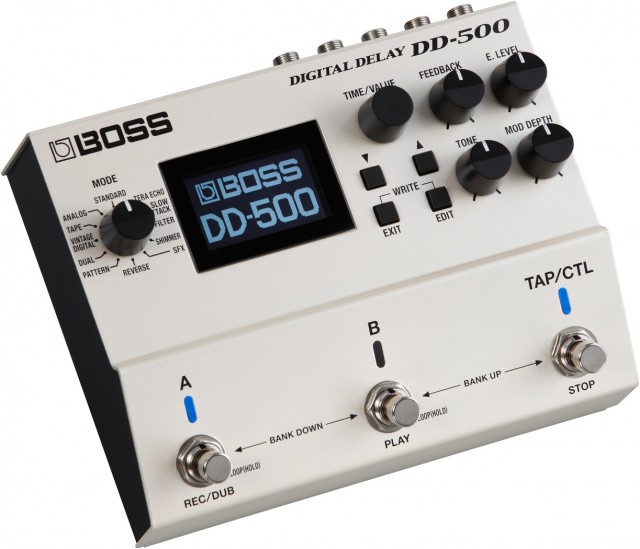
At the 2015 Summer NAMM Show, BOSS today introduced the DD-500, a new effects pedal that they call the most powerful digital delay pedal ever made.
The DD-500 stompbox offers 12 distinctive delay modes, along with deep editing controls, a graphic display, patch memories, MIDI and more.
Here’s the official video intro:
Features:
- Studio-level stereo sound with 32-bit/96 kHz processing throughout
- 12 versatile delay modes from vintage to modern deliver unlimited creative possibilities
- Unrivaled real-time expression with customizable control settings for onboard and external switches
- Graphic LCD for easy, intuitive operation while performing and editing
- Onboard patch memories and hands-on controls
- Equipped with a built-in Phrase Looper, MIDI, USB, and more
- Selectable buffered or true-bypass operation
- Runs on four AA-size batteries or PSA-series AC adapter
The Boss DD-500 has a street price of about US $299. For more info, see the BOSS site.

coming soon or will it be delayed?
i know, my bad
Do you want to rePHRASE that? You SOUND a bit LOOPy!
you want me to repeat myself?
more bad pun, my bad
Bespoke proprietary DSP technology? ….ok
Bespoke.
MY BAD My Bad my bad my m
If I get one, can I join the League of Crafty Guitarists?
Be warned folks, It doesn’t take long for this advert to descend into a U2 delay nightmare!
That already happened appropriately with the Korg SDD-3000 announcement. Which was released last year. Probably because of its shorter delay.
delay
delay
delay
Have boss done a Behringer on Strymon?
It looks a copy of Strymons timeline.
who doesn’t have a behringer item in their toolbox?
“Have boss done a Behringer on Strymon?” – This post is PEAK 2019. Outstanding.
Is looper gonna be quantized?
Front-line reports are that this pedal is so powerful that it has gained a top ten rank in the UFC.
eurorack it!
Wow that video is sooo cheezy it hurts
This isn’t even the “most powerful digital delay” announced at Summer NAMM 2015, much less “ever”
Check out the new Pigtronix ones….
Too 80s for moi
I’ve owned a fair number of Boss products and they’ve never failed, period. I got great mileage from delays, early reverbs (sometimes a bit grainy but always serviceable), EQs, random flange-oids and distortion. I encouraged a skeptical guitarist friend to go for a GT-6 and it delivers well across the board, even though he’s fussy about the wah, heh. I live in my DAW now and don’t need to hotrod with pedals anymore, but I keep waiting for someone new to do a Michael Brook number and turn several of these stellar pedals into the giant near-synth they can represent. Lexicon is the Mercedes of effects, but Boss is the dependable truck that keeps getting you back & forth to work. I owned 9 of their pedals and half-rack boxes, plus two of their logo t-shirts; I had it bad/good. I encourage you to consider one of their intermediate boxes like this one. You’ll probably be using it a decade later. If you’re mainly a monosynth user, the advice goes double. When I ran my MiniMoog through a chorus and a reverb, it came alive.
P.S. I could do a more thorough demo and I’m not even a guitarist. Step through the presets, play a few solid licks that reveal the shape of each and move to the next one. If the sound is there, most of us will tolerate a few operating quirks, but if it sounds like @$$….. this was a nice jam, but didn’t show us any of the goods.
I wish pricing was not so high. You can get the multi-effects unit with a dozen or so effects with most of what these individual pedals offer and you also get a whole array of other effects as well. It’s a stomp box being sold for 5 or 6 times the market price of a standard pedal & although Multi-effects might don’t appeal to everyone, players that have 4 or 5 different sounds that define them as a guitarist will be just fine with Basic stomp Boxes: ex: Compressor, OD/Distortion, Flanger, Pitch Shifter, Delay, Reverb. But I know this delay can inspire a solo musician who is writing or playing alone. You could do alot of things with a pedal like this if you fully utilize the features
My question: I always liked the Delay in my Boss ME-10. I am trying to find out if 2 of the parameters I’ve found useful are available in this delay or even others on the market. Boss ME-10’s had HI-CUT & LO-CUT settingsthat i was really getting use from. It helped me to taper the delay so it would remain strong and slowly disappear or gradually weaken while fading. There was some sort of effect to the tone lof the delayed sound and it helped when playing over rythmic riffs and rhythm progressions. Instead of it repeating constant, I could allow the fade of each progression to remain strong or eventually fade away, making room for another progression. It’s like being able to record a track but that track can remain or dissolve into the mix while playing live or even recording. If you’re a pink floyd enthusiast, you might know some examples of the way this may sound in some of their studio cuts. Having all the electronics goodies made alot of what they did possible (as per Roger Waters in the film “Live in Pompei”!